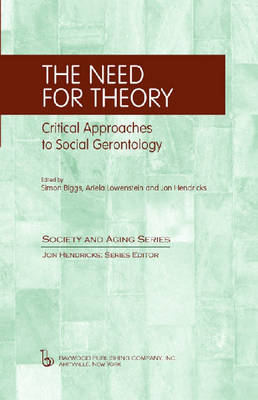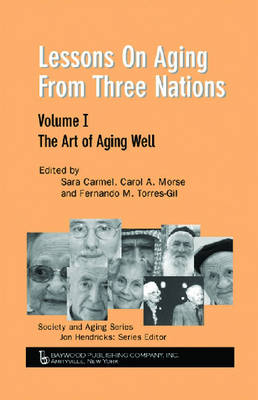Society and Aging
2 total works
The "Need for Theory" speaks to the burgeoning need for critical thinking in social gerontology. The editors have brought together some of the foremost contributors to theoretical advances in the field. This volume incorporates state-of-the-art theorizing with a focus on selected topical areas facing gerontologists around the world. Using their keen insights into substantive issues, the contributors examine personal and structural changes affecting individuals over the life course. Extolling the need for theory is not enough; the contributors focus their insights on a panoply of substantive issues, linking the personal with the political and with the structural parameters that shape the process of aging, no matter where it occurs.
Lessons on Aging from Three Nations
by Sara Carmel, Carol A. Morse, Fernando Torres-Gil, and Jon Hendricks
Published 1 May 2006
The demographic revolution - the aging of societies has become a worldwide phenomenon, affecting governments, economies, social trends, relationships amongst nations, and most of all, the elderly themselves and their families. The pace of aging differs amongst nations, however, as do the solutions for the new social needs and the rate of addressing them. Although no two nations are alike, one way for dealing effectively with new social demands is to learn from the creativity, achievements and failures of other societies. This volume examines the issues confronting global aging through the prism of three multicultural nations: the United States, Israel and Australia. All three countries face the challenges of coping with continued immigration, dramatic social and demographic change and the growing nexus of social diversity along with again but have established different infrastructures of programmes, services and public benefits for the older citizens. While highlighting their societies' experiences, the scholars contributing to this book discuss international achievements in meeting the ultimate challenge of aging well, as well as limitations and unmet needs, focusing on the art of coping with growing old, adapting to health challenges, and making a place for older persons in society. The authors not only identify the insights, indicators, and trends that may affect both developed and developing worlds, but also offer practical solutions for enhancing personal and societal well being, thus making the most of this demographic revolution. This is the first of two edited volumes on aging and caregiving. The second volume focuses on challenges and concerns for families, policy makers and governments in caregiving and end-of-life issues. In this way the editors hope to provide clues and suggestions for future research, policies and practices in the comparative study of global aging. This book will be of interest to students of gerontology and geriatrics; those working in nongovernmental organizations - private, for-profit and non-profit agencies, including voluntary charitable and religious groups, those working in national regional and local governments; and all general readers intrigued with the aging of societies and longevity.

